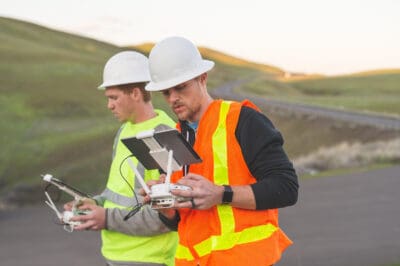

Promoting Equity and Opportunity in Green Careers
March 16, 2023
At a Glance
JFFVentures is investing to ensure that the rise of the green economy benefits everyone, especially members of communities most impacted by climate change.
This blog is the third in a series about the investment priorities of JFFVentures.
The impact investing arm of Jobs for the Future, JFFVentures supports and invests in early-stage companies that are building innovative technologies to drive learning, employment, and economic advancement initiatives that empower workers in low- and middle-wage jobs. We look for unique opportunities to advance solutions that have the potential to drive impact at scale.
Climate change is an existential threat to people everywhere, but emerging efforts to build a climate-resilient economy could stall without a resolute push to develop the talent required to achieve that goal. Data indicates that the green economy is facing a skills shortage. Intentional efforts to diversify the green workforce could solve that problem.
At JFFVentures, one of our priorities is to invest in startups that are developing innovative tools and business models that can do just that by building pathways to green jobs for workers of all backgrounds, and thereby expand the pool of talent available to a sector whose workforce is largely white and male.
In taking this approach, we’re inspired by our colleague Taj Eldridge, director of climate innovation in JFFLabs, who is working to ensure that people from communities that have disproportionately felt the negative effects of the carbon-based economy will have access to employment and wealth-building opportunities in the green economy.
Green economic initiatives are beginning to gain traction around the world: LinkedIn’s Global Green Skills Report 2022 estimates that green or “greening” jobs accounted for 10% of all global hiring activity in 2021. Meanwhile, the International Labour Organization estimates that a shift to a greener economy could create 24 million new jobs globally by 2030, and Deloitte estimates that more than 300 million new “green collar” jobs could be created by 2050.
[JFF] is working to ensure that people from communities that have disproportionately felt the negative effects of the carbon-based economy will have access to employment and wealth-building opportunities in the green economy.
Domestically, an estimated 875,000 U.S. workers hold green jobs, and the green workforce is projected to grow at a rate of 8.6% over the next decade. And the U.S. Bureau of Labor Statistics reports that two occupations related to renewable energy initiatives are among those that it projects to have the fastest employment growth from 2020 to 2030: wind turbine service technicians and solar photovoltaic installers.
Inequities Exacerbate Labor Shortages
But filling those positions could be a challenge: While green job postings have grown 8% a year globally over the past five years, the share of green talent has only grown around 6% a year during the same period, according to LinkedIn.
Building an ample supply of labor for the green economy must involve efforts to diversify the workforce by expanding training and recruiting initiatives to workers of all backgrounds so that everyone will have opportunities to pursue those jobs—and build the skills they need to succeed in them.
Currently, the green workforce is made up predominantly of white men. More than 60% of people in clean energy jobs in the United States are non-Latinx white workers, and Black and Latinx workers are less well represented in the clean energy sector than they are in the rest of the economy, according to a 2021 report. For their part, women account for just 30% of the clean energy workforce.
Reaching young people may also be a problem. In a Plan International online survey of 2,229 people between the ages of 15 and 30 from 53 countries, only 9% of the respondents said they had applied to or were employed in a job that addresses the impacts of climate change. Moreover, 32% said they don’t think they have the skills necessary for a job addressing climate change and 29% said they don’t know of any accessible job or income-generating opportunity in the green economy.
There’s clearly room for improvement when it comes to making people aware of green jobs and preparing workers to do those jobs.
Broaden the Conversation
One way to expand awareness of career opportunities in the green economy among young people and members of communities of color is to broaden the conversation by promoting the idea that getting a green job doesn’t mean just, say, working as a wind, solar, or electric vehicle technician. According to LinkedIn’s green skills report, “the vast majority of green skills are being used in jobs that aren’t traditionally thought of as green—such as fleet managers, data scientists, or health workers.” Others include arborists, environmental technicians, and safety coordinators.
There’s clearly room for improvement when it comes to making people aware of green jobs and preparing workers to do those jobs.
Employers, training providers, and workforce development organizations can use applications that support skills-based hiring to raise awareness by connecting with workers who might not know about green jobs.
One option is the talent discovery solution developed by AdeptID, one of the startups in the JFFVentures investment portfolio. A Boston-based public benefit corporation that describes itself as having been founded on the belief that “everyone is adept,” AdeptID has developed a system that enables employers to find talented workers in industries unrelated to their own and likewise helps workers identify opportunities in other sectors. It uses machine learning and predictive analytics to match people to jobs based on analysis of skills that are transferable between industries.
This type of capability is particularly useful in an emerging sector like the green economy because it helps workers understand how their experiences and interests map to jobs in areas like, say, renewable energy that they might not have been aware of.
Recruit, Train, and Hire
Other companies have adopted innovative approaches to preparing people for green jobs, with a focus on members of populations that previously haven’t benefited from green economic activity. For example, Los Angeles-based ChargerHelp, another startup in the JFFVentures investment portfolio, trains and hires technicians who maintain public electric vehicle charging stations.
Founded in 2020 by two Black women entrepreneurs, Kameale C. Terry and Evette Ellis, ChargerHelp recruits talent in communities that are disproportionately impacted by carbon emissions and whose residents are from populations that are underrepresented in the clean technology workforce, including Black and Latinx workers, women of all backgrounds, and people without college degrees. The company partners with workforce development centers to reach out to local workers. Then, in partnership with SAE International’s Sustainable Mobility Solutions unit, it trains participants, awards certifications to those who complete its programs, and hires graduates as full-time technicians who earn a family-supporting wage and receive benefits.
Of the more than 500 people it has trained, Charger Help has hired 29, 72% of whom identify as people of color.
A Just Transition to a Green Economy
At Jobs for the Future, we share Ares Foundation’s commitment to a just transition to a green economy, and we’re partnering with Ares to work on the CREST initiative, five-year, $25 million grant-funded program whose goal is to prepare individuals for climate-resilient jobs in the United States and India. As part of that effort, we’re working to create equitable access to green jobs for members of communities that have felt the worst impacts of the carbon-based economy and inequitable environmental policies.
And we know that increasing diversity in the green economy requires a fundamental shift in the makeup of businesses looking to support and create green jobs.
JFFVentures is excited to help fulfill that vision by supporting and investing in businesses that empower people in low- and middle-wage jobs and members of communities most threatened by climate change to advance climate solutions and expand the green economy.
Related Content


Closing the Software Equality Gap to Empower Frontline Workers
December 20, 2022
Honest Jobs: A Tech Startup Driving Fair Chance Hiring
December 5, 2022
ETF@JFFLabs Annual Impact Report 2021
This report offers a look at the progress that ETF@JFFLabs and our portfolio companies have made in 2021. This report offers a look at the progress that ETF@JFFLabs and our portfolio companies have made in…

JFF Ventures Fund I
Team Our team has decades of experience in impact investing, entrepreneurship, and education and workforce technologies. We are pleased to have been recognized as an emerging fund manager by ImpactAssets for three years in a…